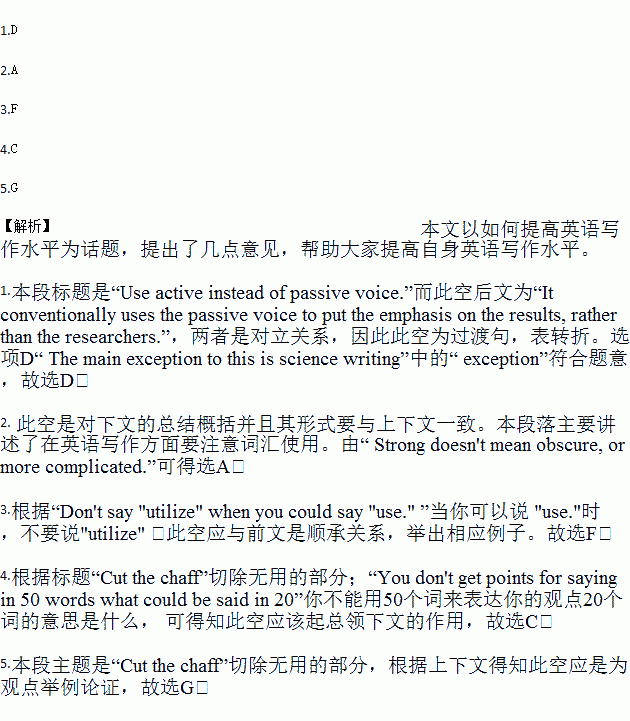题目内容
Whether you want to improve your writing skills as a creative writer or simply perfect your skills for schoolwork, you can take some steps to learn how to be a better writer.
1. Use active instead of passive voice.
In English, the most basic sentence structure is S-V-O: Subject-Verb-Object. The passive voice usually requires more words and use of a “to be” verb form, which can suck the energy out of your writing. Learn to avoid these constructions as much as you can. 1. It conventionally uses the passive voice to put the emphasis on the results, rather than the researchers.
2. 2.
Finding the right verb or adjective can turn an uninspired sentence into one people will remember and quote for years to come. Look for words that are as specific as possible. Strong doesn't mean obscure, or more complicated. Don't say "utilize" when you could say "use." 3.
3. Cut the chaff.
4. You don't get points for saying in 50 words what could be said in 20, or for using multi-syllable words when a short one does just as well. It might feel good at first to pack a lot of ideas and details into a single sentence, but chances are that sentence is just going to be hard to read. If a phrase doesn't add anything valuable, just cut it. 5. If you notice that your writing is filled with "-ly" words, it might be time to take a deep breath and give your writing more focus.
A. Use strong words.
B. Show, don't tell.
C. Good writing is simple, clear and direct.
D. The main exception to this is science writing.
E. Cutting the chaff is best done at the editing stage.
F. "He sprinted" is not necessarily better than "he ran."
G. Don't write "screamed fearfully" -- "scream" already suggests fear.
 小学学习好帮手系列答案
小学学习好帮手系列答案 小学同步三练核心密卷系列答案
小学同步三练核心密卷系列答案

 ),并在其下面写出该加的词。
),并在其下面写出该加的词。 g on the hillside overlooking the bay and near the island of the Gugh, it might just win the prize for best beer garden view in England.
g on the hillside overlooking the bay and near the island of the Gugh, it might just win the prize for best beer garden view in England. -hour walking tour,we share these special comers of NYC.
-hour walking tour,we share these special comers of NYC.